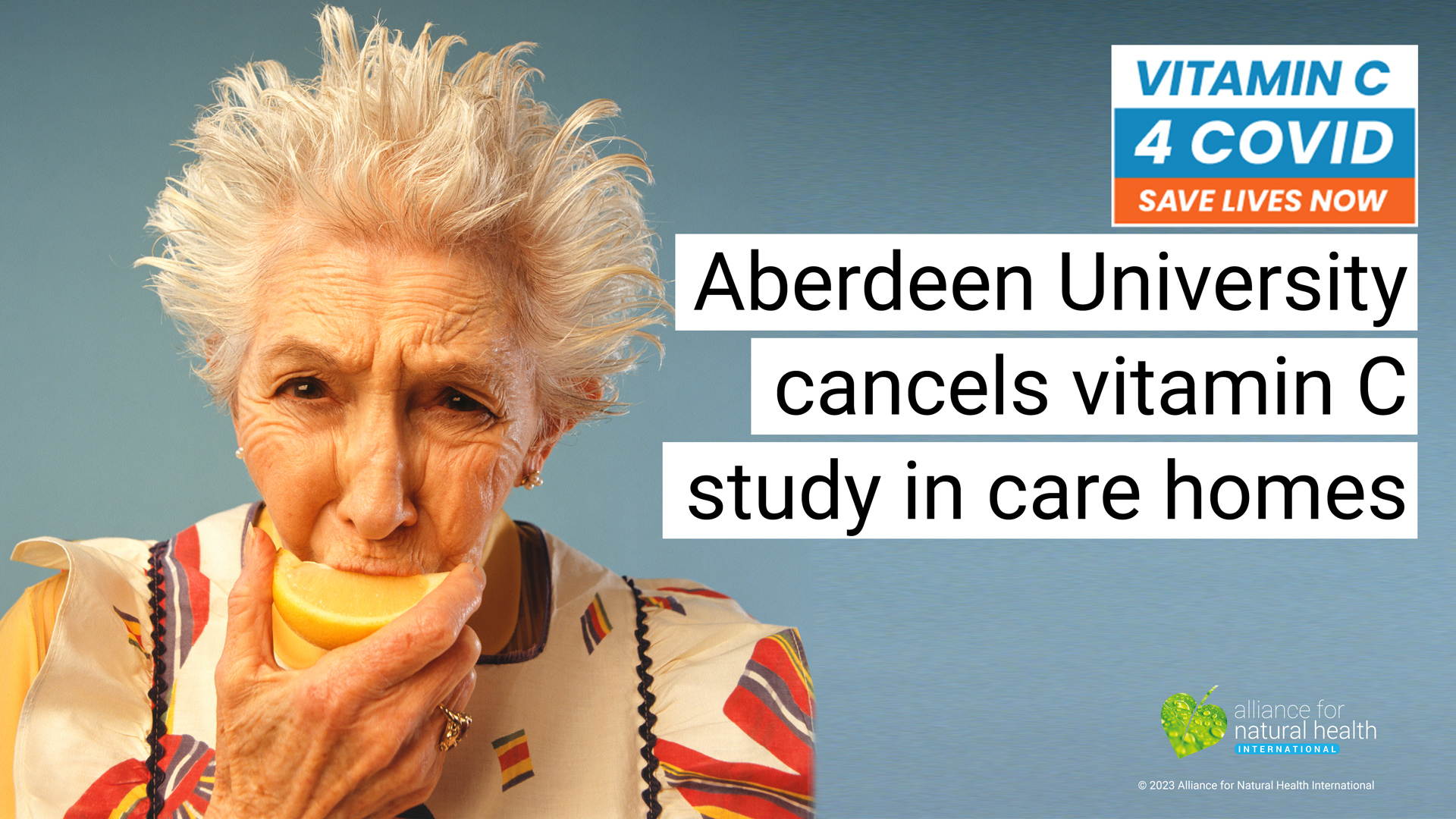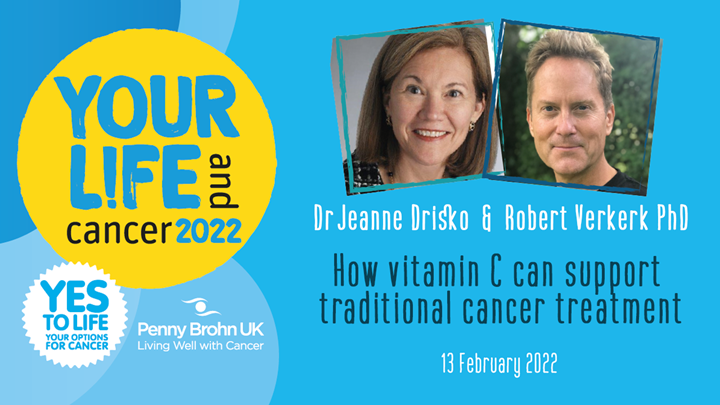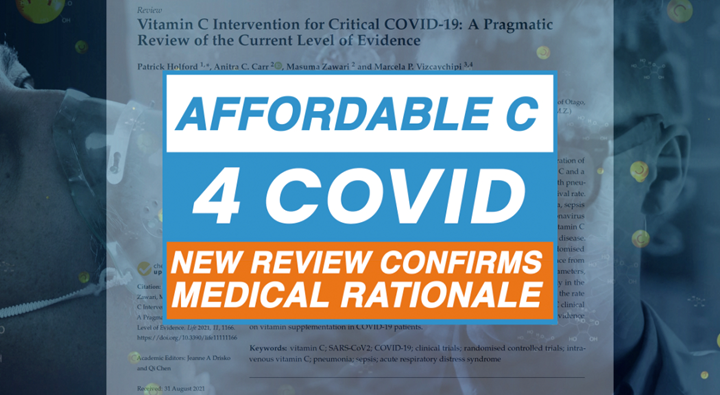Content Sections
A crowd funded study, VitaC4Care, which set out to test how much vitamin C is needed to achieve normal levels in care home residents in the UK, has been cancelled at the last minute by the University of Aberdeen, without it revealing any reasons for its decision.
It's well established that elderly people, particularly those in care homes, are at greater risk of experiencing micronutrient deficiencies — including vitamin C. Various studies show that vitamin C is one of the most important vitamins the body needs to mount a robust defence against infections, including covid, yet there are unknowns in terms of individual vitamin C status and requirements, especially in care home residents. The most recent study, carried out in 1999, estimated 40% of care home residents were deficient in vitamin C.
In 2021, the not-for-profit community interest company, VitaminC4Covid, teamed up with vitamin C expert, Prof Anitra Carr, from the University of Otago, New Zealand. Together they devised a study to investigate how much vitamin C individuals in a care setting actually need to optimise immune function and fight viral infections, such as covid, more effectively. Agreement was reached that the study would be led by Professor Phyo Myint, Clinical Chair in Medicine of Old Age, and Dr Alan Sneddon from the Rowett Institute’s Metabolic Health Unit, University of Aberdeen, together with Dr Stavroula Kastora from NHS Grampian, along with Dr Carr.
"We have no idea how much vitamin C our vulnerable elderly actually need to be fully protected.”- Prof Anitra Carr. Source
Once agreement had been reached, fundraising started in earnest to provide the University with the funds and materials needed to undertake the study. Efforts were successful and funds were transferred at the end of 2022. As far as the VitaminC4Covid team were concerned, it was a job well done and the study would soon be underway, yet the university were clearly not as committed.
On 9th June 2023, the team received a message from the university cancelling commencement of the study without providing any reasoning or reports and refusing an appeal process. As you'd expect, the team were both shocked and extremely disappointed by the university's decision, particularly given the lack of a reason for pulling support for the study. As Prof Jeanne Drisko, Professor of Orthomolecular Medicine at the University of Kansas, summed up the decision as being most likely “politics over science". As we know, vitamin C is an extremely effective intervention for a range of conditions including viral infections, sepsis and cancer. Further evidence of its effectiveness in reducing the reliance on pharmaceutical interventions is unlikely to be welcomed by those with vested interests.
Watch Patrick Holford's interview with Rob Verkerk PhD as they discuss the planned study in 2021.
Read the full press release below:
VitaminC4Covid Press Release
Aberdeen University cancels vitamin C study in care homes.
It’s well known that conditions in care homes are such that the patients are often deficient in Vitamin C, along with other vitamins and minerals. The most recent study found that 40% of residents had a level of vitamin C consistent with scurvy. Early signs of this horrible condition include weakness, unexplained exhaustion, loss of appetite, irritability and aching legs.
Within three months their condition can become a lot worse. Symptoms include anemia, bleeding gums, areas of bruising on legs and feet, tooth decay, tender and swollen joints, mood swings, gastrointestinal bleeding and a high risk of infection. Finally, vitamin C deficiency leads to death from pneumonia. Medical texts describe untreated scurvy as, “a life threatening condition and cause of death”.
Surprisingly there is no official figure for the amount needed to preserve normal immunity to infections such as covid. Since scurvy is a condition well worth banishing from care homes, we — being the not-for-profit VitaminC4Covid, a community interest company supported by over 1,000 scientists, doctors, nutritionists and frontline workers — teamed up with vitamin C expert, Associate Professor Anitra Carr (University of Otago, NZ), to devise a cheap and simple way to find out how much vitamin C a person in a care home actually needs, using vitamin C urine sticks. Each day the vitamin C dose would be increased until a change in the colour of the urine stick showed there was enough in the system.
It seemed like the best sort of science, lifesaving, not expensive and likely to win plaudits for the university that supported it. We have just discovered that although it ticked all the grant and organisational boxes, it has been cancelled at the last minute by Aberdeen University for reasons they won’t reveal.
We had earlier approached another top vitamin C researcher Professor Phyo Myint, at the University of Aberdeen, to run the study in Scotland. He also enrolled representatives of NHS Grampian and the Rowett Institute to make a robust research team to run this world-first study. It was first approved by the University’s internal processes, then applied for and got ethical approval, and was registered on clinicaltrials.gov in June 2022 which is viewable by all.
The university then requested funding of £21,820, plus various study materials. We raised all of this from people like you, and a US charity, whom the University invited to be listed as a university supporter and benefactor. We sent the money at the end of last year into their designated bank account. Materials required for the study were purchased. After two years hard work by the team the study was ready to roll early this year. Everyone at the University involved in the study, and its funding, were positive and excited to get it underway.
Then, on 9th June 2023, we receive a letter effectively cancelling the study. It said: "following internal due diligence, the University of Aberdeen is not in a position to accept these donations. We have discovered the name of the University of Aberdeen, the Rowett Institute and those of Professor Myint and Dr Sneddon have been used on the www.Crowdfunder.co.uk page: Vit C deficiency driving COVID care home deaths? The University of Aberdeen has not given permission for the use of the University and Rowett names and of our staff to be used in this material and we request that the VitaminC4Covid and Crowdfunder organisations are asked to remove this information immediately".
We were perplexed. How could the University authorities claim to not know about their own registered study, their own requests for funding and then complain, one year later, that the university’s name had been referred to ‘without permission’ in an agreed and accurate Crowdfunder campaign. We asked to see their ‘due diligence’ report. They provided nothing. We put in an official appeal.
They replied: “It is correct that for most university processes there will be an appeal process, ensuring that the University is accountable for the education it provides and the efficacy of its business processes. However, the right to accept funding is at the discretion of the institution. This ensures that the University is not required to undertake projects which are not a strategic priority. There is, therefore, no appeal process".
So, despite being really keen last year, it appears it is no longer in the ‘strategic interest’ of the University to find a simple and effective way to reduce the awful suffering that scurvy can cause in hundreds of care homes. The reasons given for their decision make no sense.
What was the ‘due diligence’? A Freedom of Information request provided internal emails saying: “Was the conversation and the reasons why we did not accept the donations recorded in any way? It may be that if we do not hold the information, then we can apply the exemption of “Information Not Held”...” The response was: “There is no due diligence report, it was a conversation with Bhatty and Liz Rattray”.
So, the claim that the decision was taken following a due diligence process was untrue. This supposedly rigorous process was just an unrecorded conversation that was used to wipe out a humanitarian study and two years’ work of the research team.
Despite the claim of ‘due diligence’ being demonstrably false the documents show that Batty and Rattray approve this statement: ‘the conclusion of our internal due diligence... is the University is not in a position to accept this donation.’ Something which the University had requested, received, accepted and left in their bank account for over six months.
Who are Bhatty and Rattray?
Bhatty is Dr Siladitya Bhattacharya, head of medicine at the University while Ratray is Dr Liz Rattray, head of ‘research and innovation’. Two medics who apparently have no interest in alleviating suffering and improving health, but have casually blocked funding for a study that could help to achieve those goals. We have asked for a letter of explanation and apology to share with all the donors who gave money in good faith. None has been provided.
‘Politics over Science’
Professor Jeanne Drisko, Professor of Orthomolecular Medicine at the University of Kansas, who had helped raise a substantial part of the funds from a US charity, aptly replied: “politics over science”. Professor Phyo Myint said, “It was equally disappointing for me". But, having pursued every means possible to have the study continue we have to conclude it is not going to happen and have, regretfully, had to accept back the funds. It’s another case of important vitamin research being blocked while the NHS spends £160 million on vastly expensive new immunotherapy drugs that are unlikely to be better than vitamin C, but can be guaranteed to produce undesirable adverse effects. Wouldn’t preventing vitamin C deficiency be an obvious first step? This study could have established how much vitamin C is actually needed for those in care homes.
END
>>> If you’re not already signed up for the ANH International weekly newsletter, sign up for free now using the SUBSCRIBE button at the top of our website – or better still – become a Pathfinder member and join the ANH-Intl tribe to enjoy benefits unique to our members.
>>> Watch Rob Verkerk PhD’s interview with Patrick Holford on the vitamin C study.
>>> Go to our Vitamin C campaign








Comments
your voice counts
19 October 2023 at 5:49 am
Take the funds raised and invest them with another University or research group that WILL undertake the study to prove the minimal amounts of C needed for preventative therapy in geriatric medicine. It is obvious the Aberdeen heads notified their other funding sources (Big Pharma) who instructed them to cancel the study because it might prove the therapies purchased now from their sources might prove their products are neither efficacious nor medically safe for geriatric patients.
21 October 2023 at 5:16 pm
As one of the funders, I've advised that I want my contribution invested in a nutrition for Alzheimers study instead rather than have my funds returned. Suggest others do likewise.
22 October 2023 at 3:46 pm
Thanks for your suggestion Danny.
Warm wishes
Melissa
26 October 2023 at 10:09 am
Quite agree, don’t give upon the Vit C one, and also Vit D …. For maintaining health in the elderly who are inside nearly all the time, both are so important and at far higher levels than the RDA.
Both are inexpensive ( especially compared to drugs to treat the patients) and easily available.
There will be a university somewhere with a board that are not prepared to be bullied .
19 October 2023 at 8:02 am
Sadly I'm no longer surprised to read articles like this. I remain disappointed and angry but not surprised. So many people are trying to raise awareness of simple steps we can take to optimise our health. The irony of their refusal to run the study is not lost on me.....all their cries for 'protect Granny' were so obviously fake. If not why would they not want to run this study to see if and how, such a simple intervention could support Granny's health?
19 October 2023 at 8:10 am
It most likely is because of politics that the study was stopped. So let the home care people teach about vitamin C (by individual's b tolerance). There is no wrong answer except for TOO LITTLE.
19 October 2023 at 11:30 am
Slightly off topic, however the NHS practice in ipswich suffolk I have been registered with for many decades without issues phoned me reminding I needed a second covid vaccination,I declined not trusting vaccination. a week later I was informed by the local health authority I was removed by the practice ,Ivry Steet from their list. It was not easy finding another GP practice to accept me given that I explained why I needed one,most did not even answere my request
19 October 2023 at 12:00 pm
Hi Tony
Thanks for sharing your experience with your local GP. We're sorry to hear you were removed by your practice for declining a second covid shot.
It seems the local authority has not recognised the fourth principle of the NHS Constitution for England that states: “It should support individuals to promote and manage their own health. NHS services must reflect, and should be coordinated around and tailored to, the needs and preferences of patients, their families and their carers….” (https://www.gov.uk/government/publications/the-nhs-constitution-for-england/the-nhs-constitution-for-england).
Might you be able to escalate this with the local authority?
We hope you've now found an alternative practice.
Warm wishes
Melissa
19 October 2023 at 12:26 pm
Thats scarey ! Please see the article in TCW by Prof Dalgleish /www.conservativewoman.co.uk/mrna-vaccines-must-be-banned-once-and-for-all/
26 October 2023 at 10:03 am
I’m in my 70’s and have asked my practice to stop sending me reminders and warning communications by text.. but they still keep coming.. maybe they’ll remove me too..
Haven’t been to Doctor for well over 10
Years..as a health practitioner I feel
Safer well away from their clutches … just wondering what they will try to enforce on elderly if the WHO get their way…
Maybe it’s worth looking around for an honest private doctor… if you can’t find a decent NHS one.. there are some , so you can get help if you really need it… think I’ll do that too.
Good luck , stay safe .
Your voice counts
We welcome your comments and are very interested in your point of view, but we ask that you keep them relevant to the article, that they be civil and without commercial links. All comments are moderated prior to being published. We reserve the right to edit or not publish comments that we consider abusive or offensive.
There is extra content here from a third party provider. You will be unable to see this content unless you agree to allow Content Cookies. Cookie Preferences